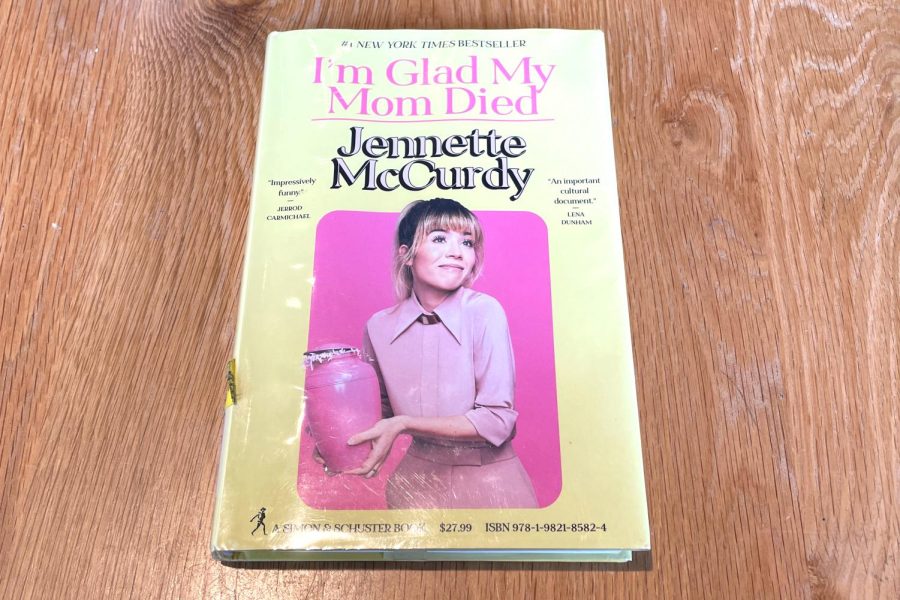Review: I’m glad I read ‘I’m Glad My Mom Died’
Photo credit: Allie Yang
The dark title of Jennette McCurdy’s memoir, “I’m Glad My Mom Died,” contrasts with the book’s bright cover. The memoir was published Aug. 9, and has since sold over 200,000 copies.
March 22, 2023
Content Warning: This article mentions eating disorders. If you or anyone you know needs support, reach out to The National Eating Disorders Association by calling or texting 800-931-2237.
Throughout my childhood, I spent hours watching Disney Channel, never giving thought to Disney Channel’s rival studio, Nickelodeon — that is, until I heard about “I’m Glad My Mom Died,” a memoir by former Nickelodeon actress Jennette McCurdy. The book details her childhood, adolescence and relationship with her late mother, Debra McCurdy.
Jennette McCurdy is best known for starring in “iCarly” and “Sam & Cat” as Sam Puckett. On the air, Puckett was upbeat, confident and loved food. In reality, however, McCurdy was unhappy, restricted and controlled by a strained relationship with food.
From the book’s first pages, the reader discovers the gravity of her past eating disorders. The prologue depicts a 21-year-old McCurdy with her brothers in a hospital room, surrounding their bedridden mother. They each share a piece of significant news in hopes of shocking their mother awake from a cancer-induced coma. When it is McCurdy’s turn to share, she leans forward with anticipation and excitedly tells her mother that she is 89 pounds, the “goal weight” set by her mom. By this point in McCurdy’s life, her mother’s goal weights and other abusive rules were typical.
To authentically describe her childhood, the memoir opens with a simple, unembellished writing style. Though the story is told through a young lens; nothing is sugar-coated. McCurdy’s childlike writing style candidly details troubling memories, with her mother’s erratic behavior often in the spotlight. When reading this part of her story, McCurdy brings her chaotic home life, which felt “like a held breath,” to light.
As the memoir progresses with McCurdy transitioning from her childhood to teenage years, she maintains unflinching honesty to describe all aspects of her life, including her acting career, which was not chosen, but rather forced by her mother at age 6.
With each audition, job booked and connection formed on set, her exasperation with her mother grows, first demonstrated by a desire to quit acting. However, if there’s one thing her mother could not stand, it was her daughter’s independence. McCurdy writes, “Her happiness came at the cost of mine … I tell myself I’m ungrateful. I’m worthless without her. She’s everything to me,” letting the reader understand the tense nature of their relationship and McCurdy’s need to bend to her mother’s will.
The book uses its 320 pages to capture a full spectrum of human emotion. Detailed descriptions of McCurdy’s journey with gaslighting, emotional manipulation, Obsessive Compulsive Disorder, anorexia and bulimia are paired with stories of friendship, new experiences and healing. That being said, the memoir avoids being disjointed because the reader only needs to follow one person: McCurdy herself.
As a result, it is difficult to decide if the book is plot or character-driven. Its strengths lie in both, which is the perfect combination to engage the reader. Though the main character is McCurdy, the most complicated is her mother.
It is easy to despise McCurdy’s mother when reading about her invasive “examinations” of her daughter’s body, damaging comments about her weight or self-pitying pleas used to keep her in an unwavering grip. But it is also easy to see why McCurdy said she does not hate her mom in a 2022 interview. Because their unhealthy relationship wove its way through every stage of McCurdy’s upbringing, her impressionable sense of self was directly influenced by her mother’s opinions. The pair’s strong attachment makes McCurdy see, and in some cases mistakenly fabricate, a humorous, caring side to her mom. The crux of the plot is her mother’s unstable mix of conditional love and inexcusable abuse.
The pressure to live for others first annoyed McCurdy and later suffocated her. After her mother’s death from a second bout of cancer, McCurdy lost the force in her life that dictated her every move. Losing the person she went to desperate measures to please shattered her sense of purpose, leading to reliance on alcohol, toxic relationships and disordered eating.
This section of the memoir is titled “after” because it takes place after her mom’s death. Everything leading up to this point is in the “before” portion. It is important to mention that the “after” section is graphic in its description of McCurdy’s struggle with disordered eating. The reader may need to process this section slowly and in small increments for their own emotional wellbeing.
This section about grief, while rooted in pain and adversity, is extremely worth reading. McCurdy exposes her humanity in her most vulnerable state, making the reader support her. Her gradual path to healing is far from easy, but the book ends with a sense of contentment.
Through it all, McCurdy assures the reader, and more importantly herself, “Mom didn’t get better. But I will.”
-
Writing
-
Story
-
Characters
-
Enjoyment
-
Impact
Summary
“I’m Glad My Mom Died” is a memoir describing the life of former Nickelodeon actress Jennette McCurdy. It details McCurdy’s career and relationship with her abusive late mother. The story is at some points sad and at others hopeful, providing an engrossing experience for all readers to enjoy. Readers should be aware that the book deals graphically with disordered eating.










Lucy Williams • Apr 17, 2023 at 8:34 am
Your first book review and it’s better than any I’ve ever read. How did you manage to page through each section of the book, add the perfect teasers to the article and not spoil ANYTHING? Beautiful writing:)